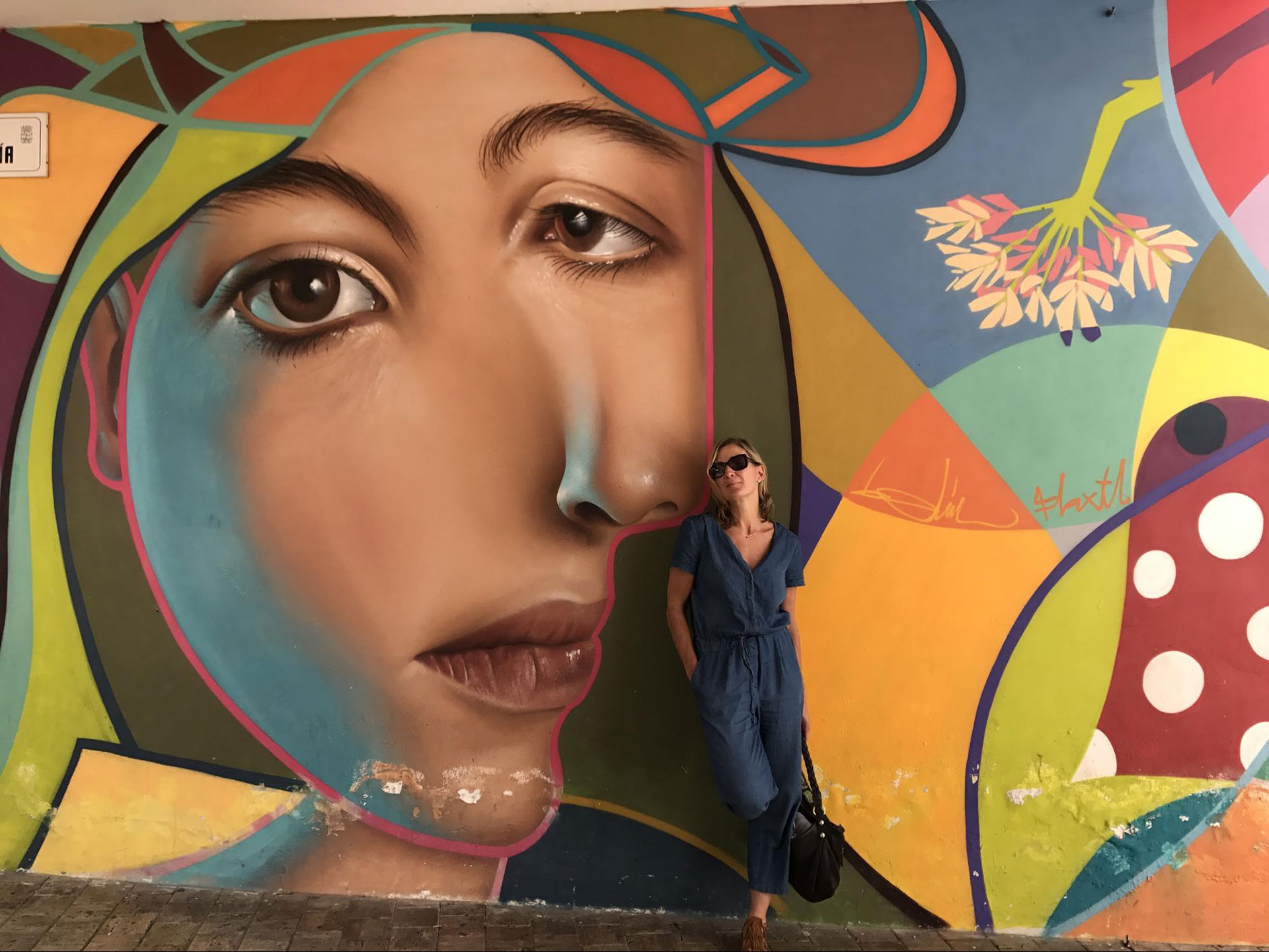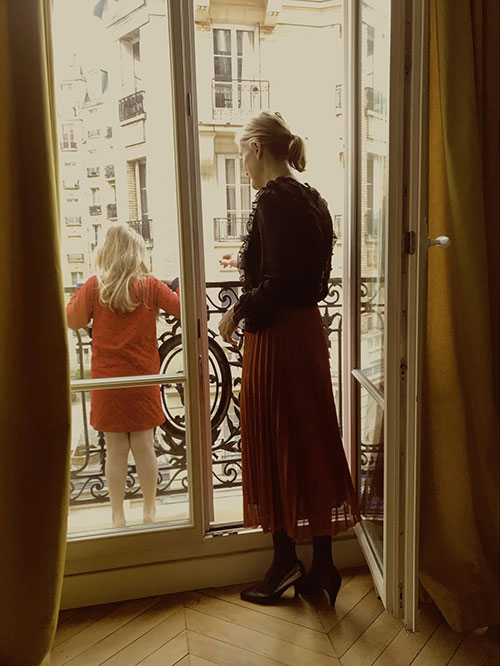#WFH Diaries: Lee Sharrock of Serviceplan
As the COVID-19 pandemic continues to wreak its havoc, we’re checking in with creative industry folks worldwide. Here’s an update from Lee Sharrock, Serviceplan Group’s international communications officer.
Give us a one-sentence bio of yourself.
International communications officer, curator, writer and mother.
Where are you living right now, and who’s with you?
In London with my husband and daughter.
What’s your work situation like at the moment?
Working from home. Although it’s nothing new for me as I’ve worked from home for three years, with a lot of travel when I’ve had meetings or work events in different countries.
Obviously the travel has stopped for now, but the way I work from home is the same: getting up at the same time every weekday, maintaining a routine, and writing a to-do list of things to achieve each day. Added to the list is homeschool, interspersed with work emails, writing communications materials, and conference calls.
Describe your socializing strategy.
FaceTime, WhatsApp (friends group and neighbors group), phone calls, talking to neighbors through the garden fence, and House Party (for my daughter!).
How are you dealing with childcare?
Taking turns with my husband to homeschool and entertain our daughter, between working from home.
What are you reading?
Elton John’s biography, Patti Smith’s M Train, Playing to the Gallery: Helping Contemporary Art in Its Struggle to be Understood, by Grayson Perry; Phoebe Waller-Bridge’s Fleabag Scriptures; and Charlie Mackesy’s The Boy, The Mole, The Fox and The Horse, a beautiful book of drawings with uplifting mantras and mottos that can help with anxiety or depression in difficult times like this.
What are you watching?
Killing Eve, and movies including Parasite and Wild Rose. Plus, old TV series like Friends and Sex and the City, making me nostalgic for a more carefree time.
What are you listening to?
Peggy Gou radio, Leon Bridges, Billie Eilish, John Coltrane, Lana del Rey’s “Norman Fucking Rockwell,” Whitney Houston’s “Love Will Save the Day,” Fleetwood Mac, and Lucio Battisti’s “Amarsi un Po” in honor of Italy.
How are you staying fit?
Skipping and star jumps in the garden, online yoga tutorials with my daughter, yoga by myself, runs along the river by myself, and my friend Rebecca’s Breathing Tree podcasts, including the Chakra Meditation to protect my mental health.
Have you taken up a hobby?
Doing more painting, collage, linocut and drawing, and playing with my daughter now that I have more time at home.
A curator friend asked me to co-curate an initiative he came up with called Isolation Art, where we invite artists to make art in isolation and post it on Instagram with the hashtags #IsolationArt #ArtFromTheLockdown. At a later date, we will organize an exhibition—either virtual or physical—to raise funds for emergency services on the front line of the fight against COVID-19.
Any tips for getting necessities?
While some people in London have been selfishly panic-buying and stripping shelves in the supermarkets, I’ve been supporting local corner shops when I need essentials or fresh fruit and veg, and our local milkman is continuing to deliver fresh eggs and milk.
An awkward moment since all this started.
Having to explain to our 8-year-old why she couldn’t see her grandparents for a while.
It was my husband and mother-in-law’s birthday last weekend, as well as Mother’s Day, but we couldn’t spend time together, so my in-laws dropped off flowers and a homemade pie on our doorstep, and we spoke from a distance. Very strange not to be able to hug someone or spend time with them in person, but it’s the best thing to do to protect our elderly relatives and loved ones.
Best work email you got since all this started.
Lots of emails from people I work with all over the world, checking in and asking if me and my family are OK. Before this crisis, a lot of work emails were all business, but now there is an increase in genuine concern and compassion from others. After all, we are in this together, whatever part of the world we live in.
An aha! moment since all this started.
That this pandemic is a wake-up call to the world to re-evaluate the way we live. That we are all in this together—I’ve been keeping in touch with friends in Amsterdam, Istanbul, Paris, Beijing, Hamburg, Munich, Vienna and Moscow, and everyone is in lockdown. We are the same, we are in the same boat, and we have to be united to get through it.
What’s your theory on how this is going to play out?
Before COVID-19 took hold of the world, there was a lot of activity and talk about global warming and climate change. I went to the Extinction Rebellion protests in London and was curating an exhibition called ArtistsXExtinction at Blacks in London, but we decided to put it on hold because it seemed that the virus was going to become a pandemic.
Ironically, coronavirus seems to be an invisible crusader on a mission to save the planet from global warming, for its silent and deadly march around the globe has enforced a shutdown of borders and flight paths, and city or countrywide lockdowns reduced cars, resulting in an overall reduction of pollution, enabling the planet to breathe for a moment.
I think this is Mother Nature’s way of telling human beings to stop, slow down and take a look at the damage we’ve been doing by flying, deforestation, messing with the animal population, obsessing about material things, and polluting our environment. This is a tough time for people, especially those who are sick or have died because of coronavirus, and the heroes and heroines on the frontline putting their own lives at risk to save others. But the pandemic enforced on much of the world’s population self-isolation or quarantine, enabling a time for reflection, mindfulness and a rare opportunity to spend time with partners or offspring at home.
Although there are reports of selfish behavior such as panic-buying, I hear about acts of kindness every day. In my neighborhood in London, we have a community organization; each street has a volunteer to coordinate help for elderly and vulnerable people who can’t get out to buy essentials or pick up prescriptions. Hotels are opening to take in homeless people, shopkeepers are making emergency care packages to deliver to the elderly. Humanity shows its best and its worst side at times like this, and I have faith that when the world comes through this crisis, we will focus on the good.
When we are out the other side, hopefully we will have taken this as a lesson that we are one race and can survive only if we look out for each other and the planet. This virus doesn’t discriminate between religions, cultures, social status, skin color, gender or borders, and when this is over, neither should we. The Butterfly Effect is real; every action has a reaction. In future, let’s be more mindful of our actions and the ripple effect they have on others.
See the full #WFH Diaries series here.









